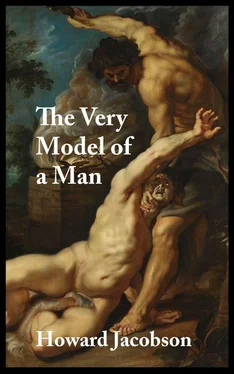You rejoice in moderation here in Babel. I ask you to remember that for us the seasons were still unsorted. The Six-day Miracle notwithstanding, it was still possible to sweat and shiver at the same time, to feel the sun frizzle on our shoulders while our feet crunched snails iced up in their shells. The earth did not know what the air was thinking; the sea enjoyed no commerce with the shore — the thing we call amphibiousness came later, when co-operation between the elements could be counted on. In our time there was no relying on a single medium to co-operate even with itself.
As it happened, we never did wake to find the sky lower than the earth, or fire flowing like fog through river beds, but that might have had as much to do with Divine Luck as Divine Judgement.
Such uncertainty, anyway, meant that my father could not take any particulars of my mother’s comfort for granted. He could be fashioning her a punkah out of palmyra one minute and be expected to lash a raft together to save her from the freezing floods the next.
I say expected, but all consciousness of obligation was on his side. For her part my mother asked for nothing beyond simple produce — cereal, root vegetables, an orange that she could pick at with her nails, the occasional small bird — and showed no gratitude for the ingenious presents he showered on her. She didn’t want another bowl. She didn’t need another ladle. She ate standing up and with her back to him, and since she had no one to entertain, could find no use for a table that sat twenty.
But indifference wasn’t the beginning and the end of what she felt. There was a design problem between them, too. She detested the look of every article he made.
In retrospect I take no sides, except to say that what the objects of my father’s hands lacked in elegance they made up for generously in size.
She passed no comments about his carpentry to his face. A complaint could have been mistaken for an acknowledgement, and you cannot acknowledge where you are determined not to notice. She kept her head turned from him and all his works: when he called to her from the heights of a tree he was lopping, she looked down; when he hallooed from underground, where he was mining coloured stones for inlay work — he loved the test that marquetry set his banana fingers — she looked up; when he approached her with his mouth full of wooden nails and his flesh flayed by scalding resin, she looked away. If circumstances forced a conversation, she curtained her eyes and addressed an incorporeality — an idea of him, so to speak, as notional as a ghost and located in some even more theoretical dimension. But when he wasn’t in her vicinity, before her or behind her, above her or below her, waiting against all experience and likelihood for his reward, wondering whether he hadn’t this time stretched the parasol or gummed the trinket box that would melt all her resistance to him, once and for all — then, then she would let her opinion of his handicraft show.
Whatever was throwable she threw, whatever was breakable she broke. Sometimes she filled the air with flying lumber, made monstrous birds of his monstrous bowls, dispatching them with an aggression so pointed and individual that they might have been pieces of my father himself. But if the object of offence happened to be some edificial shebang he had taken it into his head to knock together — some summer-hut or wind-break or cold-cupboard or tree-house or canary-cage or bee-hive or rabbit-trap or vegetable-store or wood-shed or sheep-fold or pig-pen or lean-to — she went for it as though it were a mausoleum containing the relics of her enemy entire. She shook it until her shoulders ached, and punched it until her knuckles bled, and hammered at it with her forehead until the pain behind her eyes was greater than the ugliness before them.
We looked on, Abel and I, at a loss to understand the violence my father’s woodwork inspired in her. We did not know about the destructiveness of woman. That the circumstances of her creation had been such that she would never be happy until she had undone all making and seen the globe itself beaten back to its original flatness. We were in no position to try generalities. There was only one woman for us to go on. We could see she was upset and embittered, but we could not know that she was thereby expressing her fundamentally anarchic and vengeful nature — set upon an unswerving course to pay back Divinity for having conceived her only on another’s prompting, sequentially, function first.
This is the reason you never meet true religious faith in women, not even here in Babel, where you can pick and choose among discarded deities, but only a hysterical inversion of hate parading as devotion, a sort of mockery of reverence, as like as not accompanied by high temperatures and trembling of the flesh. Since all gods must of necessity be champions of order — even godlings of chaos insist on organised ritual — and since order was woman’s undoing, how can relations between them ever be anything but ironic? Think of the little domestic world of lord and servant you all know: was there ever a wife yet that did not discharge her offices sardonically?
I mean at best. Doubly, trebly incensed, our mother did not discharge her offices at all. She turned her back on her husband’s person and smote the offerings of his hand.
You’ll never destroy them, I once said to her, they are too well-made.
She stopped what she was doing — what she was undoing — let the adzes and axes with which she’d been laying about her fall to the ground, and shook her head at me. A slow, sad shake. Not becoming in a woman who had put on too much weight, whose jowls rattled and whose cheeks flapped. And not flattering to me either, because it implied there was much I didn’t grasp and probably never would.
She repeated what I’d said. Too well-made. If you mean by that, made to last for ever, she said, then I couldn’t agree with you more. Look at the brute permanence of the things. Have you ever seen anything more monstrous? Look!
We were a demonstrative family. Look! (Look at him, your baby brother… Look!)
I looked.
Over a narrow shallow stream that we could wade across in three strides my father had thrown — no, had erected — a bridge wide enough to accommodate a whole legion of marching angels. The trunks of at least a dozen trees — Tabor oaks, carobs, pines, pistachios (all named by me and therefore mine) — were lashed together with braided bine and ivy sufficient to crochet a ladder up to God and back. Although there was not the remotest possibility of their moving, a pile of boulders secured the logs on each bank. And then more felled trees boxed in the boulders to secure them. Anyone passing — any of those strangers who secretly peopled our imaginations — would have supposed he had come upon the fortified dwellings of a pair of infuriated dinosaurs waging war across a rivulet.
I could see that it would not be easy to argue for my father’s bridge, using beauty as a criterion. The difficulty of crossing, because of all the timber and masonry in the way, steered me off the issue of utility as well.
It looks extremely safe, I said.
My mother shook her head again, more in anger than in sadness this time. And at the bridge rather than at me. It will be here in another thousand years, she said. Here for a thousand years and no doubt another thousand after that. Without beauty, without use, just… just here.
I had thought she was going to say, just… just like him.
A man can’t win, I confided to Abel when we were alone. If he made things that fell apart in a day she would still complain.
I got no answer from him. And didn’t expect one. From something like his second year to something like his seventh (while his beauty was maturating), Abel put himself into a trance, ignoring all quarrels and contention, and gave over his every waking minute to sitting in the dust, spinning shells. Nothing could distract him from this. Not hunger, not thirst, not fatigue. Sometimes he would have as many as a hundred shells of all sizes spinning together. He followed their revolutions minutely, relating the length of time they kept going to their shape and weight, to their degree of transparency and concavity, to their colour and crustation, crying at last with dizziness and exhaustion, but screaming if anyone attempted to stop him.
Читать дальше











